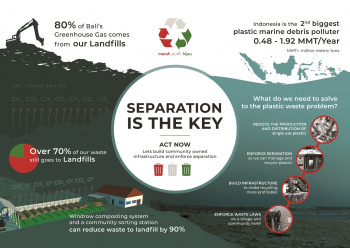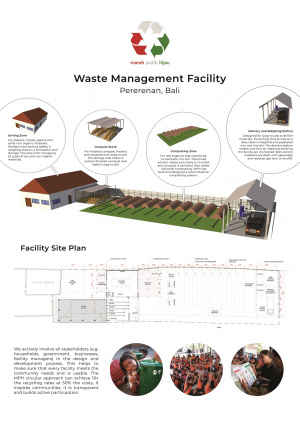Difference between revisions of "Environmental Initiative Merah Putihi Hijau"
| Line 12: | Line 12: | ||
The largest operating costs are labor and logistics. Both can be dramatically reduced and improved by building community owned waste management facilities. | The largest operating costs are labor and logistics. Both can be dramatically reduced and improved by building community owned waste management facilities. | ||
The Indonesian government supports this approach and is asking communities to establish a BUMDES Badan Usaha Milik Desa; Community owned enterprise. The BUMDES can own and operate a community waste management faciliity. Models in Pererenan and Baturiti show that revenue can quickly grow to 5,000$ US per month. | The Indonesian government supports this approach and is asking communities to establish a BUMDES Badan Usaha Milik Desa; Community owned enterprise. The BUMDES can own and operate a community waste management faciliity. Models in Pererenan and Baturiti show that revenue can quickly grow to 5,000$ US per month. | ||
| + | |Initiative innovation id=Biaya peluang/kesempatan untuk pengolahan limbah termik di Indonesia sangatlah besar (keseimbangan energi negatif, hilangnya bahan organik esensial, dan polusi). Tidak ada skala ekonomi utama untuk pengolahan limbah dengan dekomposisi biologis. Sebaliknya, peningkatan biaya logistik dan alasan lain menuntut desentralisasi dengan jangkauan luas. | ||
| + | |||
| + | Membangun fasilitas pemilahan dan pengomposan milik masyarakat akan memicu penegakan peraturan pengelolaan limbah dan hal ini akan mampu mengembalikan kualitas tanah, menyelamatkan ekosistem, serta keanekaragaman hayati di masa depan. Semua dapat tercapai sekaligus menghemat biaya pengelolaan sampah senilai ratusan juta dolar AS. | ||
| + | Biaya operasional terbesar adalah untuk tenaga kerja dan logistik. Keduanya dapat dikurangi dan diperbaiki dengan membangun fasilitas pengelolaan limbah milik masyarakat. | ||
| + | Pemerintah Indonesia mendukung pendekatan ini dan meminta masyarakat untuk membentuk Badan Usaha Milik Desa (BUMDES). BUMDES dapat memiliki dan mengoperasikan fasilitas pengelolaan sampah masyarakat. Model di Pererenan dan Baturiti menunjukkan bahwa pendapatan dapat dengan cepat tumbuh hingga 5.000 dolar AS per bulan. | ||
|Initiative matter=Because it actually reduces waste to landfill by up to 90% and it helps restore our future ecosystems and biodiversity. | |Initiative matter=Because it actually reduces waste to landfill by up to 90% and it helps restore our future ecosystems and biodiversity. | ||
Revision as of 01:40, 30 May 2019
- Name of environmental initiative
- Merah Putihi Hijau
- Related place
- -
- Related book
- -
- Related children book
- -
- Related lontar
- -
- Related folktale
- -
- Related holiday or ceremony
- -
Description
The opportunity costs of pursuing any thermic waste treatment in Indonesia are huge (negative energy balance, loss of essential organic matter and pollution). No major economies of scale exist for processing by biological decomposition. On the contrary, increased logistic cost and other reasons call for a far-reaching decentralization.
Building community owned sorting and composting facilities will lead to the enforcement of rules in waste management and it will restore our soils and save future ecosystems and biodiversity. All of this can be achieved while saving the government hundreds of millions $ US in waste management costs. The largest operating costs are labor and logistics. Both can be dramatically reduced and improved by building community owned waste management facilities.
The Indonesian government supports this approach and is asking communities to establish a BUMDES Badan Usaha Milik Desa; Community owned enterprise. The BUMDES can own and operate a community waste management faciliity. Models in Pererenan and Baturiti show that revenue can quickly grow to 5,000$ US per month.Why does the innovation or project matter?
Because it actually reduces waste to landfill by up to 90% and it helps restore our future ecosystems and biodiversity. Indonesia’s about 50 million ton of organic waste per year contribute about 11 % to the country’s greenhouse gas emissions or even 21 % when peat and forest fires are excluded. Controlled decomposition of organic waste would contribute significantly to the national goal of reducing greenhouse gasses 29 % by 2030, compared to “business as usual”.
How do you or your team know that the innovation or project is working (or making a positive contribution)?
10 years of lessons learned from Temesi Recycling, UN Showcase Award, several news articles, daily monitoring and measuring of waste to landfill, of CO2 reductions, of composting results, of plastics recycled,! www.temesirecycling.com ; www.mph-bali.org ; www.bumisasmaya.org
What has contributed to the innovation or project working?
What else would help the innovation or project be more successful?
Is the innovation or project self-sustaining? If not, what needs to be done for that to happen?
What Balinese value does this initiative invoke?
People/groups to contact
Sean Nino - nino@eco-mantra.com



Enable comment auto-refresher